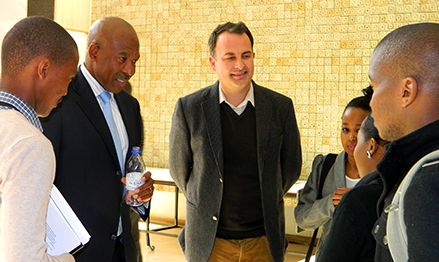Latest News Archive
Please select Category, Year, and then Month to display items
12 October 2020
|
Story Arina Engelbrecht
|
Photo Supplied
 Arina Engelbrecht from Organisational Development and Employee Well-being believes physical activity has a number of benefits for one’s health, including stress relief.
Arina Engelbrecht from Organisational Development and Employee Well-being believes physical activity has a number of benefits for one’s health, including stress relief.
Being physically active plays a big role in preventing the development of mental-health problems and in improving the quality of life of people experiencing mental-health problems.
Treatment for depression
Physical activity can be an alternative treatment for depression. It can be used as a stand-alone treatment or in combination with medication and/or psychological therapy. It promotes all kinds of changes in the brain, including neural growth, reduced inflammation, and new activity patterns are formed that promote feelings of calm and well-being. It releases endorphins – powerful chemicals in the brain that energise your spirit and make you feel good.
Physical activity can be very effective in relieving stress. Research in adults has found that physically active individuals tend to have lower stress levels compared to individuals who are less active. It also leads to improved sleep. When a person sleeps better and feels more rested, overall quality of life improves. They cope better with daily life stressors.
Reduce Alzheimer's risk
Regular physical activity can reduce your risk of developing Alzheimer's disease by up to 50%. It can also slow down further deterioration in those who have already started to develop cognitive problems. It stimulates the brain’s ability to maintain old connections as well as to make new ones.
A study asked people to rate their mood immediately after periods of physical activity (e.g. going for a walk/run, cycling, doing housework) and periods of inactivity (e.g. reading a book or watching television). Researchers found that participants felt more content, more awake, and calmer after being physically active compared to after periods of inactivity.
In conclusion, people who are physically active feel a sense of well-being, feel more energetic throughout the day, sleep better at night, have sharper memories, and feel more relaxed and positive about themselves and their lives.
“Being physically active not only changes your body, it changes your mind,
attitude, and your mood.” – Arina Engelbrecht
UFS101 students learn from the masters
2013-09-01
 |
Letsetja Kganyago (second from the left) and Dr Francois Strydom (on the right, next to him, Director of the Centre for Teaching and Learning, in discussion with third-year students.
Photo: Stefan Lotter
01 September 2013 |
Huge effort is employed to expose first-year students through the UFS101 programme to the largest possible landscapes of South African politicals, economics and other fields. The lecture that Letsetja Kganyago, Deputy Governor of the South African Reserve Bank, delivered in August 2013, was no exception.
About 4 000 students attended the lecture at the Bloemfontein Campus, of which 150 students on the Qwaqwa Campus shared in the proceedings via live streaming. Kganyago discussed the impact of the international financial crisis on South Africa, as well as on the man in the street.
Third-year and postgraduate students also had an opportunity to talk to him during his visit.
The UFS101 programme was bolstered earlier this year through lectures delivered by a judge from the Free State Supreme Court, as well as Prof Jonathan Jansen, Vice-Chancellor and Rector.